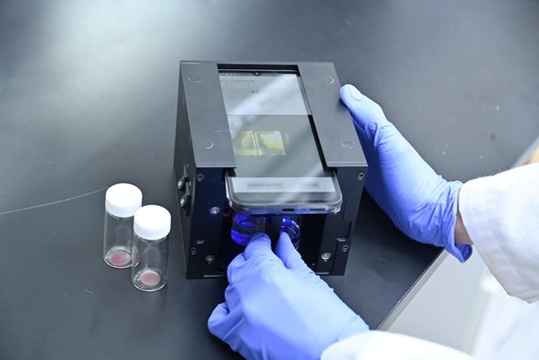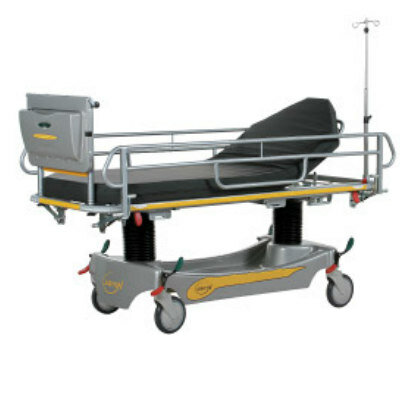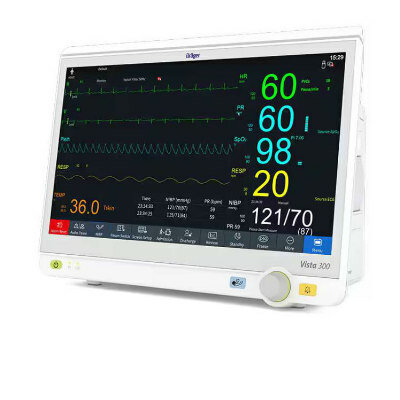Urine-Based Bladder Cancer Diagnostic Kit to Reduce Need for Unnecessary Cystoscopies
|
By HospiMedica International staff writers Posted on 21 Jan 2025 |

Bladder cancer has a high cure rate of over 90% when detected early, but it is characterized by a recurrence rate of 70%, which requires continuous monitoring. Late-stage detection often results in major surgeries, such as bladder removal and the use of an artificial bladder or urine pouch, which significantly impact the patient’s quality of life. However, current urine test kits are not very sensitive, and cystoscopy, which involves inserting a catheter into the urethra to examine the bladder, is both painful and inconvenient. This situation highlights the critical need for a simple yet reliable diagnostic method for patients. Now, a new urine-based diagnostic kit has been developed that can accurately detect bladder cancer biomarkers without the need for preprocessing the urine samples.
This innovative diagnostic tool was developed by a research team at the Korea Institute of Science and Technology (KIST, Seoul, Republic of Korea), using a method based on water and oil layering to detect biomarkers of bladder cancer. Detecting biomarkers in urine has been challenging due to their low concentration and interference from impurities like hematuria. The newly designed kit overcomes these obstacles by employing a mechanism in which a film bonded to the biomarker breaks apart, releasing a buoyant signal carrier that moves to the oil layer and emits a detectable signal. This design eliminates interference from impurities like hematuria and amplifies the signal, allowing for accurate biomarker detection. In clinical trials involving 80 patients and 25 healthy individuals, conducted with a double-blind approach, the diagnostic kit achieved a sensitivity of 88.8%, which is a substantial improvement over the mere 20% sensitivity of existing commercial tests.
Importantly, while traditional methods are almost unable to diagnose early-stage bladder cancer, the new kit is effective in identifying even early-stage cases. This diagnostic tool offers a groundbreaking approach for the early detection of bladder cancer through a simple, non-invasive urine test. It is expected to reduce the reliance on cystoscopy, improve survival rates through early detection, and enhance patients’ quality of life. Building on these promising results, the research team plans to develop products suitable for mass use in comprehensive medical centers and for easy home application.
“This study demonstrates the potential for early bladder cancer diagnosis using a simple diagnostic kit, reducing the need for unnecessary cystoscopies,” said Dr. Youngdo Jeong from KIST who led the research team.
Related Links:
KIST
Latest Point of Care News
Channels
Critical Care
view channel
Mass Manufactured Nanoparticles to Deliver Cancer Drugs Directly to Tumors
Polymer-coated nanoparticles loaded with therapeutic drugs hold significant potential for treating cancers, including ovarian cancer. These particles can be precisely directed to tumors, delivering their... Read more
World’s Smallest Pacemaker Fits Inside Syringe Tip
After heart surgery, many patients require temporary pacemakers either to regulate the heart rate while waiting for a permanent pacemaker or to support normal heart rhythm during recovery.... Read more
AI-Powered, Internet-Connected Medical Devices to Revolutionize Healthcare, Finds Study
A new study suggests that artificial intelligence (AI)-powered, internet-connected medical devices have the potential to transform healthcare by enabling earlier detection of diseases, real-time patient... Read moreSurgical Techniques
view channel
New Transcatheter Valve Found Safe and Effective for Treating Aortic Regurgitation
Aortic regurgitation is a condition in which the aortic valve does not close properly, allowing blood to flow backward into the left ventricle. This results in decreased blood flow from the heart to the... Read more
Minimally Invasive Valve Repair Reduces Hospitalizations in Severe Tricuspid Regurgitation Patients
The tricuspid valve is one of the four heart valves, responsible for regulating blood flow from the right atrium (the heart's upper-right chamber) to the right ventricle (the lower-right chamber).... Read morePatient Care
view channel
Portable Biosensor Platform to Reduce Hospital-Acquired Infections
Approximately 4 million patients in the European Union acquire healthcare-associated infections (HAIs) or nosocomial infections each year, with around 37,000 deaths directly resulting from these infections,... Read moreFirst-Of-Its-Kind Portable Germicidal Light Technology Disinfects High-Touch Clinical Surfaces in Seconds
Reducing healthcare-acquired infections (HAIs) remains a pressing issue within global healthcare systems. In the United States alone, 1.7 million patients contract HAIs annually, leading to approximately... Read more
Surgical Capacity Optimization Solution Helps Hospitals Boost OR Utilization
An innovative solution has the capability to transform surgical capacity utilization by targeting the root cause of surgical block time inefficiencies. Fujitsu Limited’s (Tokyo, Japan) Surgical Capacity... Read more
Game-Changing Innovation in Surgical Instrument Sterilization Significantly Improves OR Throughput
A groundbreaking innovation enables hospitals to significantly improve instrument processing time and throughput in operating rooms (ORs) and sterile processing departments. Turbett Surgical, Inc.... Read moreHealth IT
view channel
Printable Molecule-Selective Nanoparticles Enable Mass Production of Wearable Biosensors
The future of medicine is likely to focus on the personalization of healthcare—understanding exactly what an individual requires and delivering the appropriate combination of nutrients, metabolites, and... Read more
Smartwatches Could Detect Congestive Heart Failure
Diagnosing congestive heart failure (CHF) typically requires expensive and time-consuming imaging techniques like echocardiography, also known as cardiac ultrasound. Previously, detecting CHF by analyzing... Read morePoint of Care
view channel
Handheld, Sound-Based Diagnostic System Delivers Bedside Blood Test Results in An Hour
Patients who go to a doctor for a blood test often have to contend with a needle and syringe, followed by a long wait—sometimes hours or even days—for lab results. Scientists have been working hard to... Read moreBusiness
view channel
Expanded Collaboration to Transform OR Technology Through AI and Automation
The expansion of an existing collaboration between three leading companies aims to develop artificial intelligence (AI)-driven solutions for smart operating rooms with sophisticated monitoring and automation.... Read more



















